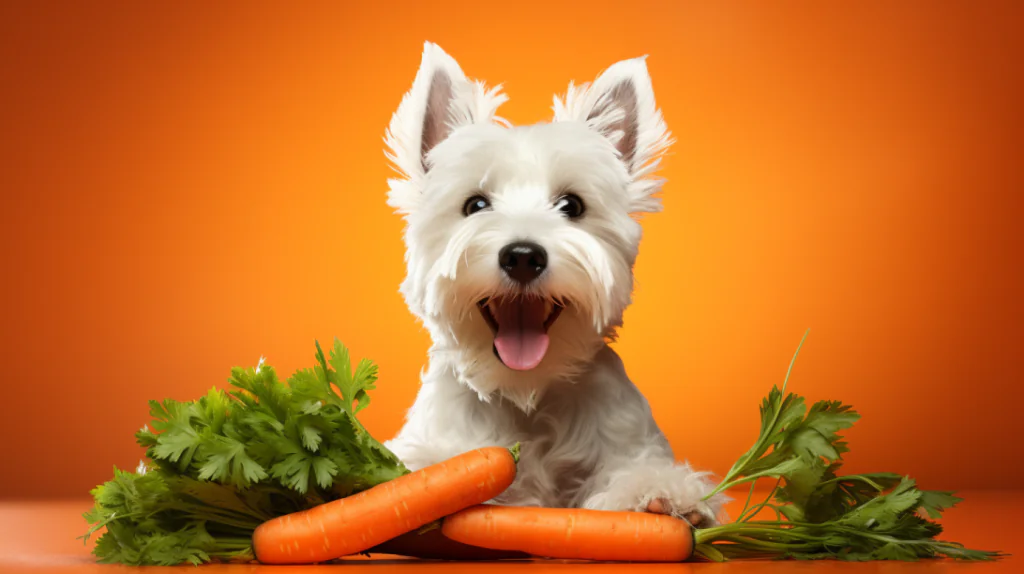Table of Contents
Are you a dog owner concerned about your furry friend’s health? Wondering if there are any special dietary considerations for your diabetic dog? Are carrots good for diabetic dogs?
Yes, look no further than carrots, the humble vegetable that might hold the secret to supporting your dog’s well-being. In this guide, we’ll explore the benefits of carrots for diabetic dogs. From promoting dental health to providing low-calorie treats and essential nutrients, carrots have much to offer.
Let’s dive in and discover how carrots can be the secret superfood for your diabetic dog’s health journey.
Key Takeaways of “Are Carrots Good for Diabetic Dogs”
- Carrots are a healthy treat option for diabetic dogs, as they are low in calories and contain natural sugars.
- Carrots are rich in essential nutrients like vitamin A, beta-carotene, and dietary fiber, which can benefit diabetic dogs’ overall health and well-being.
- Including carrots in a diabetic dog’s diet can help manage their weight, improve digestion, and regulate bowel movements.
- It is essential to introduce carrots gradually and in moderation and consult a veterinarian to determine the appropriate amount for a diabetic dog.
Understanding Canine Diabetes
Canine diabetes is a chronic condition that affects dogs, where their bodies cannot produce enough insulin or properly use the insulin produced. Insulin is a hormone that regulates blood sugar levels. Dogs can experience high blood sugar levels without proper insulin function, leading to various health issues.
Managing canine diabetes involves monitoring and controlling blood glucose levels through diet, exercise, and medication. While carrots are a nutritious food for dogs, they should be given in moderation to diabetic dogs. Carrots are low in calories and contain good dietary fiber, which can help regulate blood sugar levels. However, carrots also contain natural sugars that can cause spikes in blood sugar if given in excess.
It is essential to work with your veterinarian to develop a suitable diet for your diabetic dog. A balanced diet for diabetic dogs usually includes high-quality protein sources, such as lean meat, and complex carbohydrates, like brown rice or leafy vegetables. The diet can consist of carrots, but monitoring your dog’s blood glucose levels and adjusting the portion size accordingly is crucial.
Every dog’s dietary needs may vary, so consult your veterinarian for accurate guidance on managing canine diabetes.
Carrots: The Superfood for Diabetic Dogs

Carrots are often touted as a superfood for humans, but did you know they can also benefit diabetic dogs? While carrots may not be a miracle cure, they can certainly play a role in managing blood sugar levels and improving overall health for dogs with diabetes.
One of the main reasons carrots are considered diabetic-friendly is their low glycemic index. This means that they cause a gradual and steady rise in blood sugar instead of quick spikes that can be dangerous for diabetic dogs. Carrots also contain natural sugars, which are easier for dogs to process than refined sugars found in many commercial dog foods.
In addition to their low glycemic index, carrots are packed with nutritional benefits. They are high in soluble and insoluble fiber, which assists digestion and regulates blood glucose. Beta-carotene, an antioxidant in carrots, boosts the immune system and eye health.
A healthy diet is crucial for diabetic dogs, and adding carrots to their meals can be a simple yet effective way to provide essential nutrients. Carrots can be fed raw or cooked, but it’s important to note that excessive cooking can reduce their nutritional value. If your dog is a picky eater, you can try freezing carrots for a crunchy and refreshing treat.
When incorporating carrots into your dog’s diabetic diet, it’s important to consider portion control. While carrots are nutritious, they should be given in moderation to avoid excess calorie intake. Talk to your vet about your dog’s food needs.
Carrots can help diabetic dogs, but they shouldn’t be the only treatment. Insulin therapy, regular exercise, and a balanced diet with high-quality protein sources like lean meat or brown rice should all be part of a comprehensive diabetes management plan.
The Benefits of Carrots for Diabetic Dogs
For diabetic dogs, finding the proper diet is essential for managing their blood sugar levels. While there is no one-size-fits-all solution, incorporating carrots into their meals can bring some health benefits.
Carrots are low in calories and contain natural sugars, making them a smart option for diabetic dogs. The high fiber content in soluble and insoluble carrots helps regulate blood glucose levels and prevents spikes. Moreover, fiber promotes digestive health and can aid in weight loss or maintenance.
Carrots are also packed with essential vitamins like A, C, K, and B6. These vitamins support various functions in a dog’s body, including eye health, immune system function, bone health, and metabolism. Moreover, carrots are an excellent source of antioxidants, which can help fight off harmful free radicals and reduce inflammation.
For diabetic dogs, consulting with a veterinarian to customize a diet that suits their specific needs is essential. While carrots can be beneficial in moderation, they should be part of a balanced diet that includes high-quality protein, leafy vegetables, and other fresh vegetables. Individual dogs may have different dietary requirements, so following professional advice is crucial for their overall health and well-being.
Dental Health and Carrots

Maintaining proper dental hygiene is crucial for your diabetic dog, and incorporating carrots into their diet can help support their dental health. Here are some ways in which carrots can benefit your dog’s dental health:
- Carrots support dogs’ dental health by gently scraping their teeth and preventing plaque buildup.
- Chewing on tough carrots can clean dogs’ teeth and gums daily.
- Carrots’ crisp texture reduces plaque and tartar, improving oral health.
- Wash carrots well to remove dirt and chemicals before feeding them to your dog.
Carrots as a Low-Calorie Treat Option

Offer your diabetic dog a guilt-free snacking option with carrots, a low-calorie treat that can help manage their weight and prevent obesity-related diseases. Carrots are a healthy and nutritious choice for diabetic dogs due to their low-calorie and low-fat content. They can satisfy dogs’ sweet and crunchy cravings without adding excessive calories. Carrots are also rich in essential nutrients like vitamins A, C, and potassium, contributing to a thriving immune system, healthy skin, and coat. To engage your diabetic dog with this low-calorie treat, you can try incorporating carrots into their diet differently. Here is a table that provides some ideas for offering carrots as a treat option:
| Treat Option | Description | Serving Size |
|---|---|---|
| Raw Carrots | Serve baby carrots or cut raw carrots into bite-sized pieces. | 1-2 baby carrots or 1-2 tablespoons of cut carrots |
| Steamed Carrots | Lightly steam carrots to enhance their flavor and make them softer for easier digestion. | 1-2 tablespoons of steamed carrots |
| Carrot Sticks | Cut carrots into stick shapes for a fun and interactive treat option. | 1-2 carrot sticks |
Always consult with your veterinarian for appropriate portion control and ensure that carrots are suitable for your diabetic dog’s specific needs.
Carrots and Digestive Health

To support your diabetic dog’s digestive health, regularly incorporate carrots into their diet.
Carrots are high in dietary fiber, which aids in digestion and helps maintain regular bowel movements. The fiber in carrots can draw water into the intestines, softening stools and preventing constipation.
Additionally, carrots contain soluble fiber, such as pectin, which improves digestion, reduces diarrhea, and helps manage blood glucose levels.
Furthermore, the magnesium found in carrots can improve bowel movements and overall digestive health.
Nutritional Value of Carrots for Dogs
Carrots provide critical vitamins and minerals for dogs’ wellbeing. Dietary carrots can help diabetic dogs. Carrots’ low glycemic index means they barely affect blood sugar. The fiber in carrots helps decrease the absorption of sugar, making them a suitable choice for dogs with diabetes.
Additionally, carrots are high in dietary fiber, which aids in digestion and helps control loose stools. Incorporating carrots into a high-fiber diet for diabetic dogs can promote regularity and improve digestive health. However, feeding carrots in moderation and consulting with a veterinarian for proper portion control is essential.
Transitioning into the next section, let’s explore precautions and considerations for feeding carrots to diabetic dogs.
Precautions and Considerations for Feeding Carrots

When it comes to feeding carrots to your diabetic dog, there are a few precautions and considerations to remember.
- While carrots are generally safe for dogs, some may have allergies or sensitivities.
- Introducing carrots gradually into your dog’s diet and monitoring for any adverse reactions is essential.
- Also, consult your veterinarian to determine the appropriate amount of carrots for your dog based on size, age, and health condition.
- Remember that carrots should supplement a balanced and complete dog diet, not a replacement for it.
Allergies or Sensitivities
If your dog has any allergies or sensitivities, it’s essential to introduce carrots gradually into their diet and closely monitor for any adverse reactions. Some precautions and considerations to keep in mind when feeding carrots to your dog include:
- Consult your veterinarian to determine the appropriate carrots for your dog based on size, age, and health condition.
- Too many carrots can lead to an upset stomach or diarrhea in some dogs, so moderation is key.
- Remember that carrots should supplement a balanced and complete dog diet, not a replacement for it.
- If you notice any signs of allergies or sensitivities such as itching, vomiting, or diarrhea, discontinue feeding carrots and consult your veterinarian.
When feeding carrots to diabetic dogs, it’s essential to consider their nutritional value and health benefits. Carrots are low in calories and contain natural sugars, making them suitable for diabetic dogs. However, moderation is essential to prevent weight gain and other health issues. Always consult with your veterinarian for proper feeding recommendations and portion control.
Portion Control for Diabetes?
Talk to your vet about how much carrots to feed your diabetic dog to ensure adequate portion control. Due to their minimal calories and fat, carrots can help diabetic dogs. However, it is essential to feed carrots in moderation to prevent weight gain and potential health problems. The table below outlines the recommended portion control guidelines for feeding carrots to diabetic dogs:
| Dog Size | Carrot Portion |
|---|---|
| Small (up to 20 lbs) | 1 to 2 baby carrots or 1/4 to 1/2 of a medium carrot |
| Medium (21 to 50 lbs) | 2 to 3 baby carrots or 1/2 to 1 medium carrot |
| Large (51 to 90 lbs) | 3 to 4 baby carrots or 1 to 2 medium carrots |
| Extra Large (over 90 lbs) | 4 to 5 baby carrots or 2 medium carrots |
Following these portion control guidelines will help ensure that your diabetic dog receives the nutritional benefits of carrots without overdoing them. In the next section, we will explore the dietary qualities of carrots for diabetic dogs.
Feeding Recommendations for Diabetic Dogs
To properly feed your diabetic dog, it’s essential to consider their specific dietary needs and consult with a veterinarian for appropriate feeding recommendations.
- When it comes to feeding a diabetic dog, carrots can be an excellent addition to their diet. Carrots are low in calories and contain natural sugars, making them suitable for diabetic or overweight dogs. They’re also rich in essential nutrients like vitamin A, which supports eye health and improves skin and coat.
- Additionally, carrots are high in dietary fiber, aiding digestion and controlling loose stools. However, feeding carrots in moderation is essential to prevent weight gain and other health issues.
- Carrots play a role not only in managing diabetes but also in preventing chronic diseases.
Carrots and Their Role in Preventing Chronic Disease
Can carrots genuinely play a role in preventing chronic diseases in dogs, including diabetic dogs?
Answer: yes. Beta-carotene, lutein, lycopene, anthocyanins, and vitamin C are antioxidants in carrots. These minimize oxidative stress and prevent diabetes, arthritis, inflammation, premature aging, and cancer. Antioxidants eliminate free radicals that harm cells and cause chronic diseases.
Dogs may not produce enough antioxidants, making carrot consumption beneficial. Additionally, carrots contain nutrients like vitamin A, which supports eye health, and dietary fiber, which aids digestion and controls loose stools.
Including carrots in a diabetic dog’s diet can provide these health benefits and contribute to overall well-being.
Frequently Asked Questions
Can Carrots Cure Canine Diabetes?
Carrots cannot cure canine diabetes. While they are a safe and healthy addition to a diabetic dog’s diet, they should be given in moderation due to their natural sugar content. Consult with a veterinarian for proper portion control.
Are There Any Side Effects of Feeding Carrots to Diabetic Dogs?
Feeding carrots to diabetic dogs may have some side effects. Carrots contain natural sugars, so moderation is vital to prevent weight gain. Consult your vet for appropriate portion control and monitoring.
What is the best type of meat for diabetic dogs?
Lean meats like skinless chicken, turkey, or lean cuts of beef are good options for diabetic dogs, as they provide protein without excessive fat. Consult your veterinarian for specific dietary recommendations based on your dog’s needs.
Is it safe for a diabetic dog to consume milk?
Many diabetic dogs can tolerate small amounts of milk, but monitoring their response is essential as some dogs may be lactose intolerant. If there are no adverse effects, you can incorporate small portions of lactose-free or low-fat milk into their diet.
Can diabetic dogs eat chicken as part of their diet?
Yes, skinless and boneless chicken is a suitable protein source for diabetic dogs. It’s vital to ensure the chicken is cooked thoroughly and free of added fats or seasonings that can affect their blood sugar.
Is pumpkin a suitable food for diabetic dogs?
Pumpkin can be included in a diabetic dog’s diet in moderation. It’s high in fiber and can help regulate blood sugar levels. However, always consult your vet to determine the appropriate portion size.
Should diabetic dogs be given milk in their diet?
Milk can be given to diabetic dogs in moderation, but monitoring for any signs of digestive discomfort or lactose intolerance is essential. Low-fat or lactose-free options are often better choices.
Can my diabetic dog safely consume milk as a part of their diet?
Many diabetic dogs can consume milk safely in small quantities, but monitoring their response is crucial. Some dogs may be lactose intolerant, so it’s advisable to opt for lactose-free or low-fat milk and consult your vet to determine the most suitable diet for your dog’s specific needs.
Conclusion
In conclusion, carrots can be a beneficial addition to a diabetic dog’s diet. They offer various advantages, such as promoting dental health, providing low-calorie treats, and improving digestive health. Additionally, carrots are packed with essential nutrients that support overall well-being.
However, it’s important to note that carrots should supplement a balanced and complete diet for your dog rather than replace it. As an interesting statistic, did you know that carrots contain only 6% sugar, making them a suitable option for diabetic dogs?
Reader Advisory: This article, aimed at informational purposes, does not replace professional veterinary advice. While we aim for accuracy, we make no guarantees regarding the completeness or reliability of our content. Always consult a veterinarian before altering your dog’s diet or nutrition.




